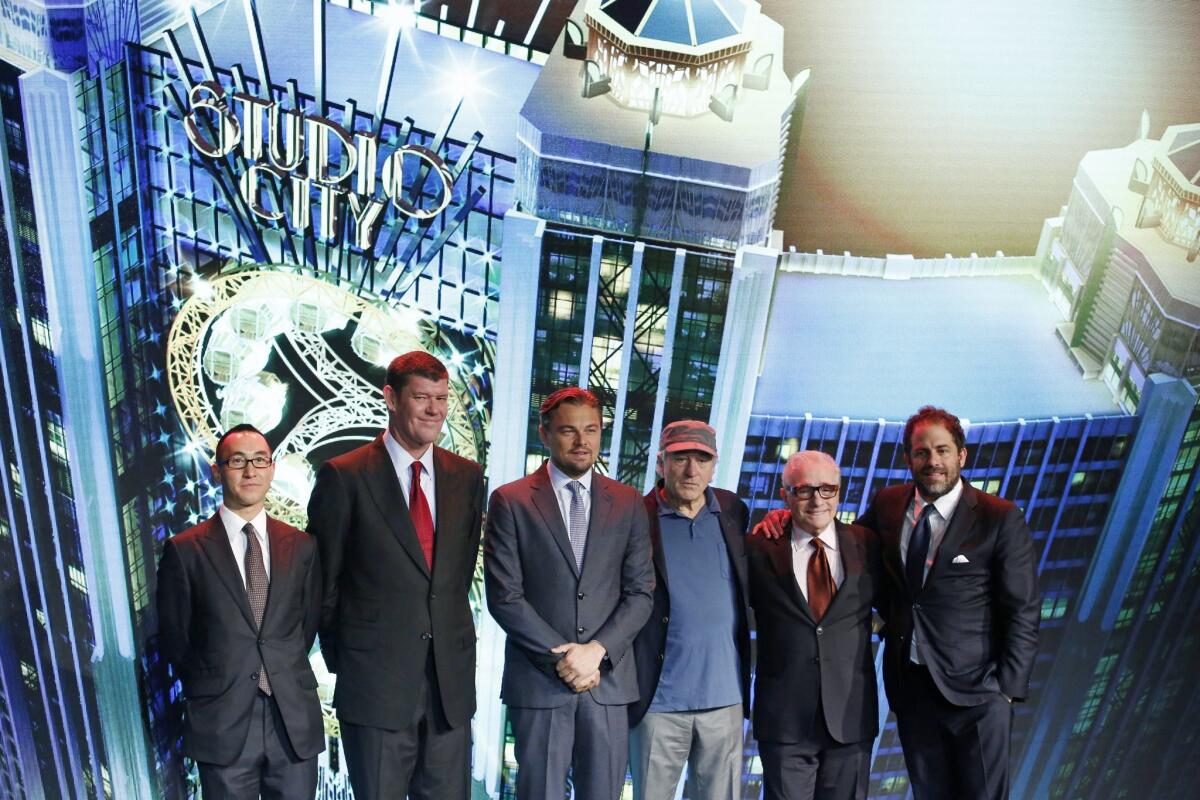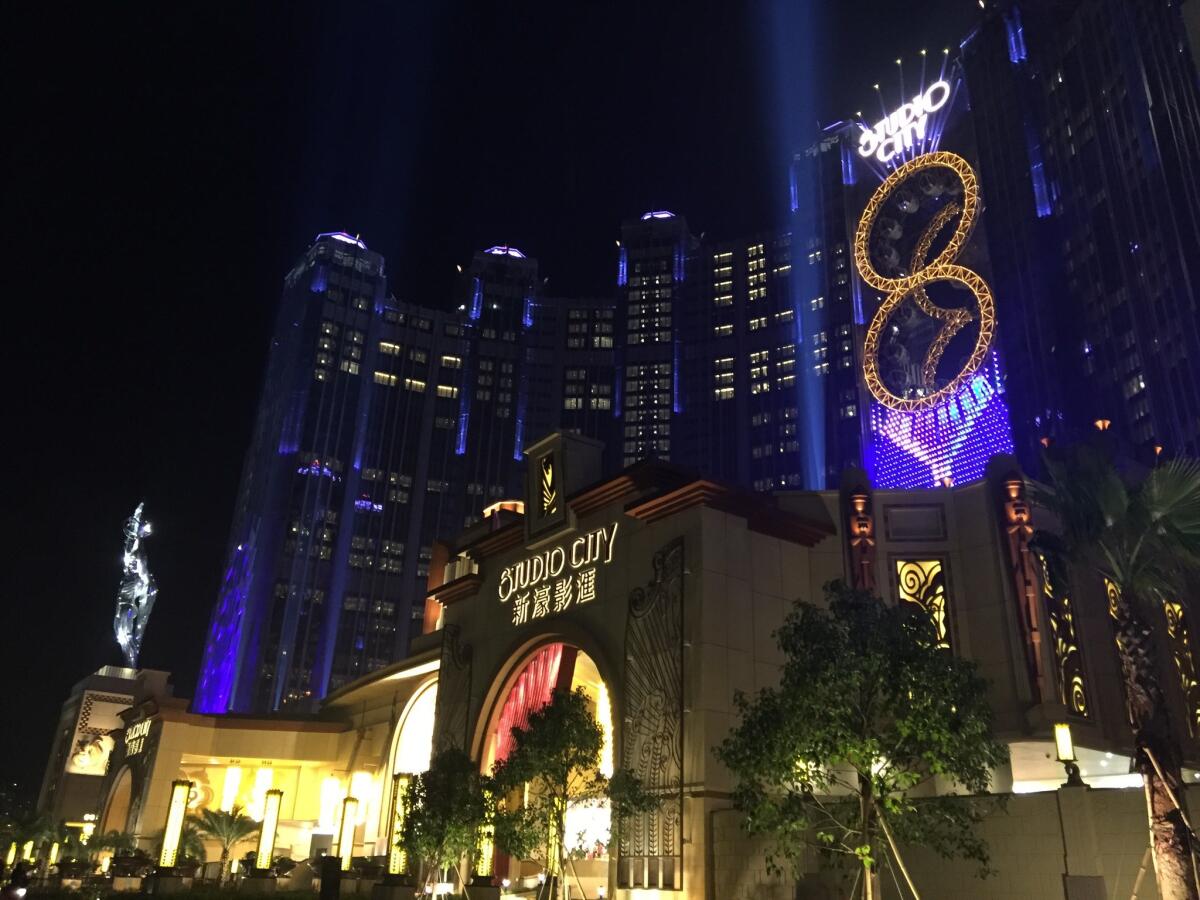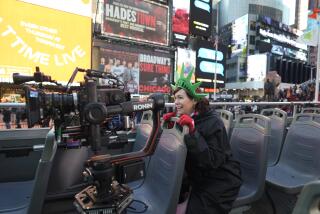Did a Chinese casino really just pay $70 million for a 15-minute Martin Scorsese film?

Melco Crown Entertainment co-chairman and chief executive Lawrence Ho and co-chairman James Packer pose with film stars Leonardo DiCaprio, Robert De Niro, director Martin Scorsese and producer Brett Ratner during a launch ceremony of the Studio City project in Macau.
Reporting from Macau, China — Did a Chinese casino really just spend $70 million on a 15-minute film/advertisement directed by Martin Scorsese and starring Brad Pitt, Robert De Niro and Leonardo DiCaprio?
That was the eye-popping number that started circulating last year even before a trailer for “The Audition” was released online in January. Outlets including Page Six, quoting anonymous sources, said the actors pulled in a cool $13 million each for the gig -- though the whole thing only took less than a week to shoot.
True or not, the figure certainly stoked interest in the brief movie, whose plot centers on De Niro and DiCaprio -- playing themselves -- unexpectedly finding themselves at a casino, vying for the same role in a Scorsese film. Pitt doesn’t even come in until the 12-minute mark.
SIGN UP for the free Indie Focus movies newsletter >>
On Tuesday, as Melco Crown Entertainment threw open the doors to its $3.2-billion Hollywood-themed casino resort called Studio City in Macau, Scorsese, De Niro and DiCaprio were on hand for a red-carpet event (Pitt was nowhere in sight and was said to have prior commitments). The movie was then shown in the resort’s 5,000-seat theater. (Footage from the movie has also been cut into advertising-like clips.)

The Studio City casino resort in Macau, China.
------------
FOR THE RECORD
Oct. 27, 5:16 p.m.: An earlier version of this article stated that the Studio City casino resort cost $3.2 million. It cost $3.2 billion.
------------
How the short movie came to be is an object lesson in global show business networking -- and even if there was no massive payout for the participants, they certainly have business and personal reasons to scratch one another’s backs.
The company behind Studio City is Melco Crown Entertainment, a venture of Chinese gaming mogul Lawrence Ho and Australian magnate James Packer. But Packer is also the “Pac” in RatPac Entertainment -- the other half being Hollywood producer/director Brett Ratner.
Packer and De Niro, meanwhile, are also business partners -- earlier this year, they opened a Nobu Hotel in a casino resort in the Philippines. Acting-wise, DiCaprio and De Niro go way back -- one of DiCaprio’s first films was “This Boy’s Life” with De Niro in 1993. And of course, Scorsese has worked separately with De Niro and DiCaprio on numerous projects, from “Taxi Driver” to “The Departed” to “The Wolf of Wall Street.”
Then there’s the Ratner-Packer-Pitt link: RatPac in 2013 made a financing deal with Pitt’s Plan B production company.
Opening-day media materials for “The Audition” avoided putting any dollar figure on the project. Packer, in an interview with The Times on Tuesday, wouldn’t confirm the $70-million figure -- though he didn’t dismiss the notion that such an outlay would be outlandish.
“The way I think about it is -- our company, Australia Crown, is paying for half of it, and Lawrence’s company is paying for the other half of it. And so if the numbers that are quoted are right, and it’s over three years, and you divide that by two, it’s 11 bucks a year,” he said. “For the best marketing campaign in the history of the world. So it depends on how you allocate and look at it.“
Asked if he stood behind the $70-million figure, Packer said: “I’m not saying it. But I’m saying if that was the case, and you thought about it the way I just described it, all of a sudden it’s not so much.”
In the same interview, Ho said the short film was an “incredible” way to promote the resort in the age of social media and smartphones. And he added that it would likely score his company brownie points with Macau’s government, which has been pushing casino operators to add more entertainment offerings to their gaming temples. “Nobody in this market, at least from the government’s standpoint, has seen anything like this. This is really a historic moment for Macau.”
Though Tuesday’s screening was billed as the world premiere, “The Audition” actually debuted rather quietly earlier this month at South Korea’s Busan International Film Festival. The movie had been announced as a selection at the Venice Film Festival over the summer as well, but was pulled at the last minute, with organizers citing “technical” issues (though there had been some carping that the festival would be lowering itself to showcase such an overtly commercial piece).
SIGN UP for the free Indie Focus movies newsletter >>
Giving “The Audition” any kind of festival credibility could bolster backers’ assertion that the movie is a film, not a commercial. Communist Party authorities aren’t keen on casino advertisements in mainland China -- even though the vast bulk of visitors to Macau, a former Portuguese territory that reverted to Chinese rule in 1999, are mainlanders.
Ho said Melco has already placed “The Audition” in cinemas in the semi-autonomous Chinese territory of Hong Kong as sort of a bonus offering (or 15-minute ad, depending on one’s point of view) before main attractions.
“We’ve put it in cinemas in Hong Kong and are thinking of putting it in China soon” before films, Ho said. “No one’s going to go pay for a 15-minute movie. But I think it’s already paid off in terms of the investment, because virally everyone knows about it.”
“The Audition” was scripted by Terrence Winter, who penned Scorsese’s “Wolf of Wall Street” and created the TV series “Boardwalk Empire.” Though “The Audition” is set partly in the Studio City resort, as well as in the Philippines and Japan, the entire production was actually filmed in New York and appears to involve a lot of CGI.
In a news conference Tuesday, Scorsese defended the project, saying he had great creative freedom.
“A short film is even tougher in a way” than a full-length feature, said the 72-year-old Oscar winner. “It has to be something that’s not a prologue to a bigger work. It has to be contained in and of itself.” He called it “not biographical but a kind of reality-based, with humor about ourselves.”
“In making movies, you have to have a sense of humor,” he said.
Packer gave credit (or blame) for the concept to De Niro, though the actor joked that when he first saw the storyboards for the project, he was skeptical that the project was actually going to work.
“I was on a boat and I was going to throw it overboard,” he said. “It turned out to be a nice experience for all of us together.”
Ratner said shooting the entire project in New York was possible because the architect-builders of Studio City had created 3-D renderings of the project and the movie team was able to use those to re-create the casino. (Even if they had wanted to shoot in Macau, the casino wasn’t built yet.)
“The technology that was used for this was incredible because we shot this whole thing in New York. We mapped out the casino exactly the way it was,” Ratner said.
“It’s the equivalent of our storyboard process, our pre-animation. So we had these 3-D renderings, and when we got them, we gave it to Marty’s visual-effects guys, and we said look, we don’t have to come to Macau we can shoot this in New York and digitally build it.”
And as RatPac eyes deeper involvement in the still-restrictive mainland China film market, having “The Audition” as a calling card certainly can’t hurt, Packer and Ratner said.
“Ratpac, we want to build a business in China,” Packer said. “And I think this is a demonstration of our capacity to bring talent together.”
Follow @JulieMakLAT for news from China
More to Read
From the Oscars to the Emmys.
Get the Envelope newsletter for exclusive awards season coverage, behind-the-scenes stories from the Envelope podcast and columnist Glenn Whipp’s must-read analysis.
You may occasionally receive promotional content from the Los Angeles Times.







